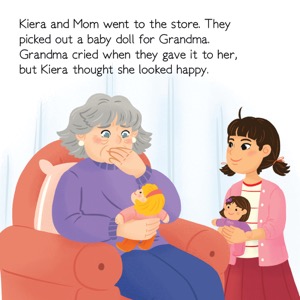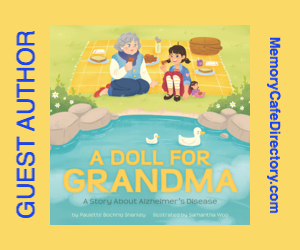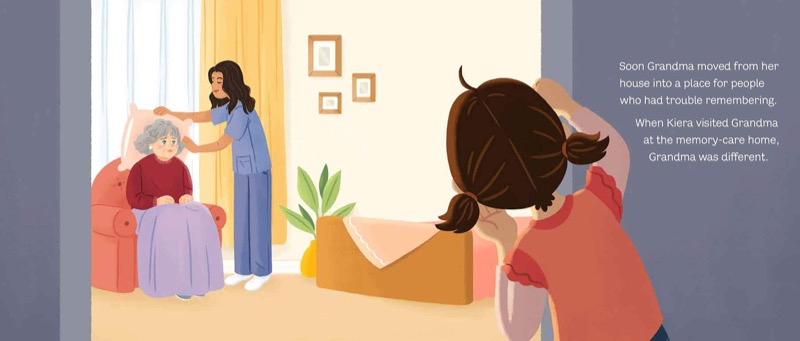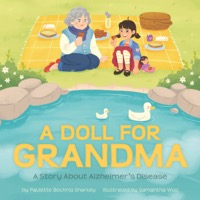Memory Cafe Directory posts and/or links to retailers can be advertising, sponsored, or affiliate links. We may earn a small commission from them. Thank you.
Links to Amazon and other retailers on this page are affiliate links. When you click through and make a purchase, Memory Cafe Directory earns a small commission from the retailer. Thank you.
A Doll for Grandma: A Story about Alzheimer’s Disease
By Paulette Bochnig Sharkey
“Grandma’s brain is forgetting how to remember,” Mom explained.
I’m a writer and a pianist. About 15 years ago, around the time I retired from my job as a university reference librarian, I read that musical memories are held in a part of the brain often left undamaged by Alzheimer’s disease.
That means people with Alzheimer’s who can no longer recognize family or friends can still respond to music, especially music they have a strong emotional connection to, like the music of their youth. Even those who can no longer speak can sometimes still sing old, familiar songs.
The music unlocks the lyrics from their long-term memory.
I decided to see this for myself by visiting a memory-care unit and playing the piano for the residents. I focused on popular songs from the first half of the 20th century. Their response was astounding.
The Power of Music
Sophie and the Big Band
There was Sophie, who sang and played clarinet in an “all-girl” big band back in the 1940s. When I first met her, she was sitting at her lunch table, staring at her food, looking vacant. But then I started playing “Jersey Bounce,” and soon she was tapping out the rhythm with one hand, spooning up her macaroni and cheese with the other.
Leo the Dancer
I met Leo, an extrovert who loved to dance. Alzheimer’s disease didn’t seem to slow him down. As long as I played something danceable, Leo was on his feet. He was happiest—jubilant, really—when I played his favorite song: “12th Street Rag.” He’d jitterbug, his thick white hair flying. If I had a picture of him in those moments, I’d caption it “sheer joy.”
Dara’s Eyes
Sparkly-eyed Dara talked a lot, but her words were jumbled, incomprehensible. Until I played “You Are My Sunshine” and she sang along, each word loud and clear.
What a privilege to bring music to Sophie, Leo, Dara, and so many others. I started a blog to share my experiences as a volunteer pianist.
How to Best Love People with Dementia
Those memory-care residents taught me a lot about what it’s like to live with Alzheimer’s disease. I continued learning when I got involved in caring for a beloved uncle diagnosed with Alzheimer’s in 2015. We spent many happy visits talking about deceased family members as if they were still alive—because to my uncle, they were.
I wanted to write a book that showed how to best love people with dementia: just as they are, without correcting their misperceptions or trying to bring them back into our reality.
I’d been working on a children’s book about pianist Clara Schumann for a while, but I decided to set that aside to work on what became A Doll for Grandma.
Raising a Dementia-friendly Generation
It’s likely that a child growing up today lives in a family touched by Alzheimer’s or other type of dementia. That child needs help understanding what is happening to their grandparent, their aunt, or their neighbor.
A Doll for Grandma is for children ages 4-8. A little girl named Kiera and her grandmother always have fun together. Then Kiera notices that Grandma is changing, leaving keys in the refrigerator, knitting hats too small to fit anyone’s head.
 When Grandma moves into a memory-care home, Kiera has to find a new way to play with Grandma. She does this by embracing the altered sense of reality inside Grandma’s mind: Kiera gives Grandma a doll and they take care of their “babies” together.
When Grandma moves into a memory-care home, Kiera has to find a new way to play with Grandma. She does this by embracing the altered sense of reality inside Grandma’s mind: Kiera gives Grandma a doll and they take care of their “babies” together.
It’s a story about empathy and kindness and the special bond between grandparent and grandchild. It’s about loving and accepting people as they are, even when they change.
The Setting
Most of the story takes place inside a memory-care home, a setting seldom depicted in children’s books. I wanted to show what goes on there so that it could be a little more familiar and a little less frightening to children who visit.
Most children’s books about dementia focus only on confusion and memory loss. I also show Grandma experiencing other common physical and behavioral symptoms as well: sadness, fidgeting, difficulties walking. But above all, I want children to see that moments of joy and human connection are still possible.
At the end of the book, there’s a parent page to encourage family discussion, written by Judy Cornish, founder of the Dementia & Alzheimer’s Wellbeing Network® (DAWN).
I’m fortunate to be able to donate all my author proceeds to support Alzheimer’s research.
What Readers Say
Here’s what readers are saying about A Doll for Grandma:
“A Sensitive and reassuring story for children about Alzheimer’s disease, as seen through the eyes of a grandchild who finds a way to rekindle the bond she once had with her grandmother.”
Nadia Ali, freelance writer, author, and blogger
“A tender story about the delights of intergenerational bonds, this book presents Alzheimer’s disease to children within a comfortable context, helping to ease confusion and answer questions about the changes in a beloved grandparent.”
Rosie J. Pova, author of Sunday Rain
“A Doll for Grandma is tender and rich with emotion: love, loss and the joy of finding each other again. It tackles a difficult issue with sensitivity, in a way that can be understood by the youngest children.”
Kate Simpson, author of Finding Granny
“Paulette Bochnig Sharkey does a wonderful job of addressing the challenges families face while coping with memory loss.”
Jaclyn Guenette RSW, DCA, author of I Smile for Grandpa
Paulette Bochnig Sharkey

Paulette Bochnig Sharkey
Paulette worked for many years as a librarian, first in her home state of Michigan, and later in Australia, Nevada, and Wisconsin.
Her writing has appeared in Parent & Preschooler, Parents, Highlights for Children, Cricket, and other magazines.
She has also worked as an indexer, braille transcriber, developmental editor, proofreader, and ghostwriter. A Doll for Grandma is her first children’s book.
Connect with Paulette
Website: PauletteSharkey.com
Twitter: @pbsharkey
Book Details
A Doll for Grandma: A Story about Alzheimer’s Disease by Paulette Bochnig Sharkey
Illustrated by Samantha Woo
Beaming Books, 2020
Available on Amazon
Be our next Guest Author!
Read more Guest Author stories or
learn how you can be a Guest Author
here on Memory Cafe Directory.







